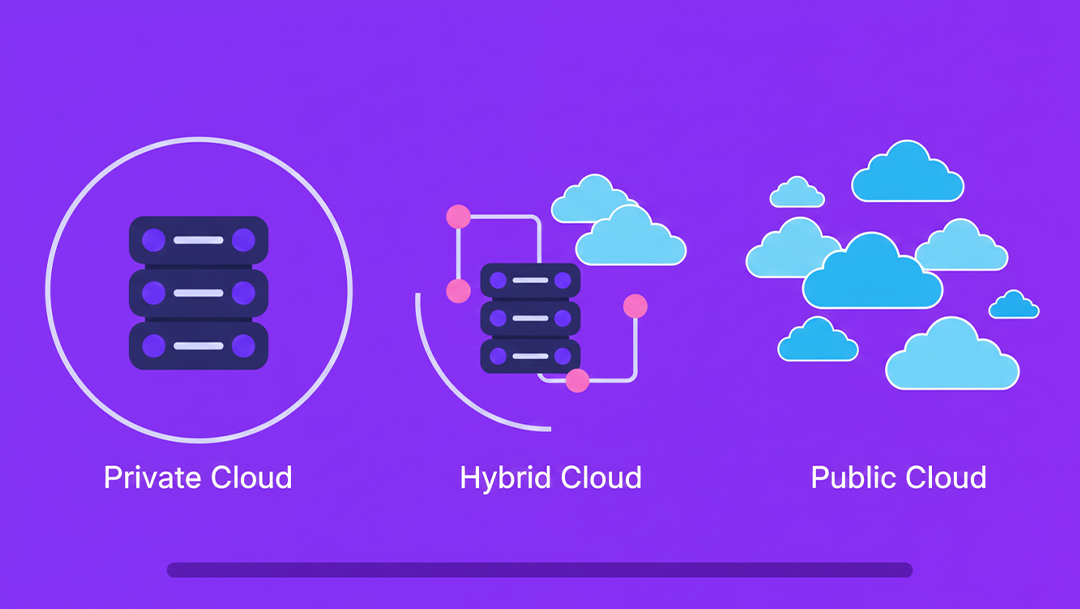Let’s be honest for a second, managing a growing business website is stressful. You’re constantly balancing the need for speed and security with a budget that isn’t exactly “Fortune 500” size yet. You might be wondering: “What if my hosting could deliver enterprise-grade control and uptime, but without the cost or complexity of building my own data center?”
It’s a valid question. For a long time, small businesses felt stuck. You either stayed in the shared hosting (cheap, but sometimes slower and limited), or you bought your own physical server room, which is incredibly expensive.
This guide gives you instant clarity on what private cloud hosting means and why you should care. If you are a freelancer or a digital agency managing client sites, you will learn exactly how to evaluate providers and how providers like UltaHost can help you scale your business.
Key Takeaways
- Private cloud hosting uses single-tenant infrastructure, meaning it is not shared with other users, giving you exclusive use of the resources.
- It is the perfect fit for Small and Medium Businesses that handle sensitive data, face high traffic volumes, or have strict requirements for uptime.
- The factors to look for are performance, support quality, cost predictability, and security measures.
- A practical migration checklist and a specific UltaHost feature map to help simplify the decision process.
- The goal is for readers to leave knowing exactly whether a private cloud is worth the investment for their specific situation.
| “A private cloud gives smaller teams the control enterprises enjoy – predictable performance, strict isolation, and full visibility into resources.” – UltaHost Cloud Infrastructure Analyst, 2025 |
What Is Private Cloud Hosting?
If you look up the official definition from the National Institute of Standards and Technology (NIST SP 800-145), they will tell you that a private cloud is infrastructure provisioned for exclusive use by a single organization.
The Core Difference: Single-Tenant vs. Multi-Tenant

The main difference between the two is defined here:
- Public Cloud: Multi-tenant. You share the hardware with other users. If their site gets attacked, your site might slow down.
- Private Cloud: Single-tenant. The hardware is dedicated to you.
A huge misconception is that “private cloud” means you have to buy servers and stick them in a room. That’s the “On-premises” model, and yes, it has high control, but it also comes with a high cost.
Private Cloud for SMBs
Explore benefits, costs, and key factors SMBs should consider before choosing a provider.
Most SMBs opt for Hosted Private Cloud. This is where the infrastructure is owned and managed by a provider such as UltaHost, but it is strictly isolated for you. You get the power without the hardware maintenance. If you go a step further with Managed Private Cloud, the provider even handles the updates, security patching, and scaling support.
Quick Comparison
| Feature | Public Cloud | Private Cloud | Hybrid Cloud |
| Tenancy | Multi-tenant (Shared) | Single-tenant (Dedicated) | Mixed |
| Cost | Low entry, variable bills | Higher entry, predictable | Variable |
| Control | Low | High | Flexible |
| Best For | Startups, testing | SMBs with sensitive data/high traffic | Workloads |
Benefits of Private Cloud Hosting for SMBs
Why would a small business pay a premium for this? It comes down to business value, not just technology.
1. Security & Isolation
In a shared environment, you are only as secure as your nearest tenants. If they have a vulnerability, it could impact the whole server. With a private cloud, no resource sharing means you reduce the risk of data leaks.
If you are in a regulated industry, it is much easier to align with compliance standards like HIPAA, GDPR, or PCI-DSS when you can prove exactly where your data lives and who has access to it.
2. Customization
Because you aren’t sharing, you don’t have to use the same software stack as everyone else. You can choose the specific CPU, RAM, and storage configurations that match your workload.
Example: If you run a WooCommerce site that eats RAM, you can set up your environment specifically for that performance-sensitive app.
Choose Smart Cloud Hosting
Learn how private cloud hosting helps SMBs balance performance, security, and cost.
3. No More Billing Surprises
You have increased traffic, and suddenly your bill triples. Private cloud usually operates on fixed or subscription pricing. This makes it ideal for businesses that need to budget for stable or fluctuating workloads.
4. Performance
When you use dedicated NVMe SSDs in a private environment, you get consistent I/O (input/output) and latency. You aren’t waiting for the server to finish processing someone else’s request before it handles yours.
5. Compliance
The Department of Health and Human Services (HHS) guidelines emphasize dedicated infrastructure for security controls. Being situated on a private cloud enables you to have the tools to customize your hosting to a HIPAA-compliant cloud environment, although simply having the cloud does not automatically give you the flexibility to remain compliant.
Potential Obstacles and Assumptions
To earn your trust, I think I should openly discuss the truth on some of these matters:
- Costs: Compared to the public clouds and shared hosting, private cloud hosting typically has a higher upfront cost.
- Resource Planning: There is no virtual Cloud environment compared to the public variability, so some resource planning is required.
- “On-Prem” Assumptions: Private cloud must mean no one else has access. We already discussed the reality that private clouds can be remotely hosted. You are not forced to hire an IT staff.
Classify your workload using this basic data flow:
- Do you have sustained and predictable activity? -> Private Cloud
- Do you have fluctuating and unpredictable activity? -> Hybrid or Public Cloud
Choosing a Private Cloud Hosting Provider

No two providers are the same. Check for the following to avoid getting extras:
- Infrastructure for Performance: Ensure there are NVMe SSDs. Check that there are redundant power and network connections. Check the SLA. It should guarantee at least 99.9% uptime.
- Security Measures: Ensure that you select providers that offer basic free DDoS protection, firewalls, isolation, daily backups, etc.
- Customer Support You should have 24/7 customer support on a help desk or live chat, not a bot. You should have human support.
- Opacity: Is there a bandwidth policy? Is the pricing not variable? Do they offer a refund policy?
- Assistance with Migration: Look to see if they offer free migration. This saves you not only downtime, but also the cost of paying a third-party developer to transfer your data, as well.
Relocating to Private Cloud Hosting
Are you primed for the transfer? Let’s begin:
- Evaluate Your Current Configuration: Analyze your bandwidth consumption, your uptime history, and the shortcomings in your security. Be clear on what you are aiming to resolve.
- Establish Your Objectives: Is the transfer due to compliance? Or pure operational efficiency?
- Select Your Provider: Select those that offer free migration and NVMe storage first.
- Backing Up: Duplicate all files. Then, conduct the restore process to validate that the backup works.
- Cut-over Planning: Pick a moment with little to no traffic to make the transition. Confirm the timing for the DNS switch.
- Confirm After Migration: On the new server, conduct load tests to monitor for changes in latency and validate the restoration process for your backups.
- Watch The Migration: In the first week, watch the performance and monitor the response time for support to see how quickly they respond.
SMBs: facing the Reality of Hybrid Cloud.
You have probably heard of a Hybrid Cloud. It is the new standard within modern SMBs.
Many have a Private Cloud as their core, which is where their most sensitive customer information and their important apps are housed. They then connect a Public Cloud to manage their demand.
| Private cloud hosting gives SMBs enterprise-level control, security, and predictable performance without the cost or complexity of running their own data center making it ideal for high-traffic, compliance-sensitive workloads. |
As an example, an online retailer might operate on a private cloud for security reasons but will burst to the public cloud for the temporary traffic spike over Black Friday.
A Compliance & Regulatory Snapshot (US)
Disclaimer: Please seek legal counsel for specific compliance requirements.
You must understand the rules if you are working with sensitive data.
- NIST SP 800-145: One of the most important documents for cloud model design. It details the administrative, physical, and technical safeguards needed.
- HIPAA Security Rule: If you work within the healthcare sector, you must follow the HHS.gov guidelines regarding patient data privacy. These guidelines are very strict.
- Shared Responsibility: The HHS Cloud Guidance states that compliance is a Shared Responsibility. The cloud provider is responsible for securing the cloud, and you are responsible for securing the data within the cloud.
- FTC Data Protection: General small business security can be accessed through the FTC Data Protection Resources.
How UltaHost Assists in Private Cloud Hosting
We offer private cloud solutions from UltaHost so that small companies can access the level of enterprise-level capabilities without breaking the bank.
The following are the specific solutions that correspond to the checklist we provided above:
- Reliability: We offer a 99.9% uptime SLA and redundant infrastructure.
- Real Security: We provide a suite of security features that includes free daily backups, DDoS protection, and standard isolated environments.
- Human Support: We have 24/7 human staff on chat and ticket helpdesk. People and answers to actual questions.
- Risk-Free: We offer free migration, no bandwidth limits, and a 30-day money-back guarantee.
- Simplicity: You can concentrate on growing your company while we take care of the technical complexities with our managed setup.
The UltaHost Difference
| User Concern | UltaHost Solution |
| Performance | Dedicated NVMe SSD infrastructure |
| Migration | Free migration & setup |
| Security risks | Free daily backups + DDoS protection |
| Limited support | 24/7 human assistance |
| Sudden Cost | Normal pricing & unlimited bandwidth |
| Trust Commitment | 30-day money-back guarantee |
FAQs
What distinguishes private cloud and shared hosting from one another?
In shared hosting, the resources are divided among numerous users, whereas in a private cloud, all resources are allocated to just one user.
Is the private cloud more expensive?
There is typically a slightly higher monthly fee compared to shared hosting; however, you would get predictable monthly bills and fewer outages, which will save you money over time.
Is the private cloud applicable to small businesses?
Yes, certainly. It is indeed more popular among agencies, e-commerce businesses, and other small to medium enterprises that manage sensitive information.
Can you scale the private cloud?
Yes, you can. Most providers, UltaHost included, let you scale resources and even add more services on a hybrid model as you progress.
Do you automatically comply with HIPAA if you use the private cloud?
While using a private cloud provides the essential measures for HIPAA compliance, you will also need to look at your content configurations, your internal policies, and your provider’s compliance.








